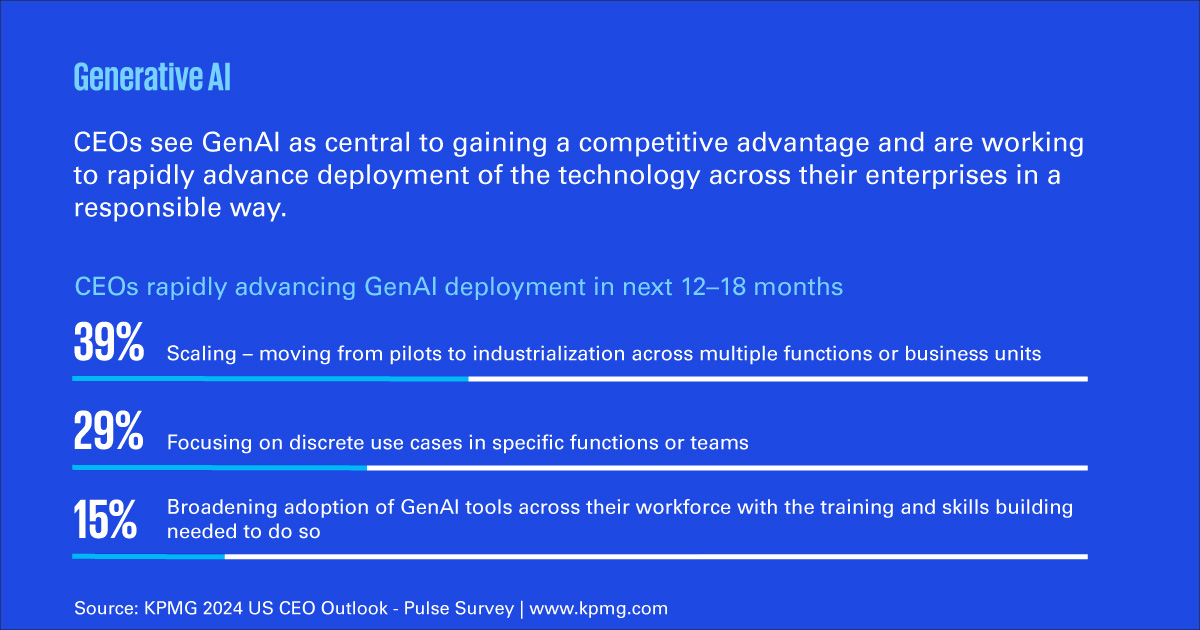When Brad Miller became the chief information officer at drugmaker Moderna in early 2023, he already had a strong background in finance and technology, but no expertise in health care.
“Learning about pharma and biotech was really critical,” says Miller, who had previously been CIO at Capital One, held leadership roles at Mastercard, and spent 17 years in engineering at Amazon and Microsoft.
To get up to speed, he read books about drug discovery at the recommendation of Moderna CEO Stéphane Bancel, listened to podcasts, and held “Regulatory 101” sessions with the company’s regulatory affairs chief to understand how Moderna’s drugs graduated from research to clinical trials, and finally to manufacturing.
Miller joined Moderna at an inflection point. With demand for its COVID vaccines slipping, the company has set a goal of introducing up to 15 drugs over a five-year period to treat cancer along with rare and infectious diseases. A respiratory syncytial virus (RSV) shot, which will be Moderna’s second drug in the market following its COVID shot that debuted during the pandemic, is poised for a U.S. approval decision by May and will generate $280 million in revenue this year, according to analyst estimates.
“We were a research company,” says Miller. But with a bigger focus on clinical trials these days, Moderna has had to lean on different technology to support its evolution. One example is the use of generative artificial intelligence to better understand the doses needed to make drugs effective in clinical trials. Moderna is now processing that data within a matter of days, rather than weeks.
Part of what lured Miller to Moderna was that it had been built on newer technology. He wouldn’t have to move data from legacy systems to the cloud. Also, AI was already deeply ingrained into the culture, including for drug design, clinical trial operations, and manufacturing.
But there were still a few skeletons in Moderna’s closet. It had been exploring a multi-cloud strategy, in which compute and storage were with several different cloud providers. Miller put a stop to it and has instead placed a single bet on Amazon Web Services. “Let’s get great at one cloud,” explains Miller. “I didn’t want to spend really, really valuable resources having to deploy that in multiple clouds and multiple environments.”
Miller also discovered that Moderna had 18 different contract companies building over 30 different websites. That was untenable, and he worked quickly to empower Moderna’s engineers to do that work internally.
Amid the frantic pace of the pandemic, Moderna has also become more responsible with what it spends on compute and storage. “It’s really about bringing the engineering excellence principles that I learned at Amazon and Microsoft, and how to build great software at scale, to Moderna,” says Miller.
One project Miller steered last year was the launch of mChat, the company’s internally developed generative AI product. Lately, use of mChat by Moderna’s employees has been slipping as the company leans more on ChatGPT’s Enterprise, a business version of the popular OpenAI tool that was designed to address concerns about corporate data security. “OpenAI surpassed us,” says Miller, explaining the pivot. Today, 80% of the company’s employees use either mChat or ChatGPT Enterprise daily.
Within the first two months of the launch of ChatGPT Enterprise, Moderna says the first 500 users who were onboarded have created more than 700 GPTs. GPTs are customizable versions of ChatGPT that can be used for a variety of tasks, including data analytics or creating images, without any coding experience.
“They’re not using it as just a conversational engine or a search engine,” says Miller. “Because of the training process we brought our employee base through, they understand the value of what GPT can do for them.”
John Kell
Send thoughts or suggestions to CIO Intelligence here.
NEWS PACKETS
Generative AI is reducing hiring needs. With AI costing up to millions of dollars annually to implement a single use case, some CIOs are telling the Wall Street Journal that they hope the technology can deliver savings by reducing the number of employees they’ll need to hire. For example, KeyBank has deployed a conversational AI tool to reduce the volume of calls to human customer service agents. CIO Amy Brady explains that less call volume will probably mean less hiring. Meanwhile, specialty vehicle maker Oshkosh CIO Anupam Khare expects generative AI to help boost employee productivity, reducing the need to hire even as employees are promoted.
But employers are also fighting over AI talent? The computer science whizzes who can build and apply generative AI systems are in high demand. Five of the major AI employers—Apple, Google, Meta, Microsoft, and OpenAI—are hiring for 501 generative AI roles combined, according to Fast Company. Because building, training, and steering generative AI models depend on trial and error, employers are putting a premium on those who have gone through that costly process at other companies.
Cloud service providers were defrauded in a “cryptojacking” scheme. A pair of unnamed but “well-known” cloud computing service providers were robbed out of more than $3.5 million worth of services by a Nebraska man who allegedly created false identities to register accounts with cloud providers and gain access to their processing and storage without paying for it, USA Today reports. Cryptojacking can result in financial losses for cloud providers as fraudsters gobble up data to mine cryptocurrency, ignoring mounting unpaid subscription fees in the process.
ADOPTION CURVE
CEOs say their organizations are rapidly advancing their deployment of generative AI over the next 12 to 18 months, with 39% of those surveyed by accounting giant KPMG saying they are moving from pilots to industrialization across multiple functions or business units. Meanwhile, 29% remain focused on discrete use cases for specific functions or teams, and 15% say they are scaling their generative AI efforts across their workforce with training and skill building.
The survey of 100 CEOs also found that 41% of organizations plan to increase their spending on generative AI next year, while 56% expect their overall investment to stay flat. But challenges remain: 27% say employee resistance was a top challenge when deploying AI across the business. There are also concerns about ethical challenges, security and compliance, and integration with existing systems and processes.

JOBS RADAR
– Consolidated Communications announced several leadership changes, including naming David Koehl as CIO. Koehl, who will lead IT transformation initiatives, was previously chief technology officer at Metronet.
– Leidos has named Alexandra Guenther as CIO after more than 11 years in various leadership positions at the IT and engineering services company.
– BlackLine has appointed Jeremy Ung as CTO, reporting to founder and co-CEO Therese Tucker. Ung was most recently CTO at Apptio and also held leadership roles at AWS, and senior program and software management roles at Microsoft and MDA.
– Talkdesk announced Munil Shah as CTO to bolster the company’s AI innovations and customer experience. Shah will be part of Talkdesk’s executive leadership team, reporting to CEO Tiago Paiva.
– Keepit has appointed Kim Larsen as its new chief information security officer. Larsen has more than 20 years of leadership experience in AI and cybersecurity from the government and the private sector.
– Tegria has named Jay Sultan as its first chief data and analytics officer. He takes on the new role after more than 30 years of health care technology and strategy experience, including at TriZetto, LexisNexis, and Cognizant.
– The Air Force has appointed Chandra Donelson as the acting chief data and AI officer, where she will be responsible for developing and implementing strategies for enterprise data management, analytics, digital transformation, and responsible and ethical AI.
– Blue Mantis has elevated Gary Yu, the company’s VP of IT, to the role of deputy CIO. Yu is taking the job after the company promoted Jay Pasteris, formerly CIO and chief information security officer, to the newly created position of chief operating officer.
– Varroc has appointed Fritz Abraham as CTO for the company’s operations in India. He will report directly to CEO Arjun Jain and lean on his experience of over two decades in the automotive industry.
– Strive Gaming has announced that Ian Smith has joined as CTO, after prior roles at William Hill, Rank Group, and Flutter Entertainment.










